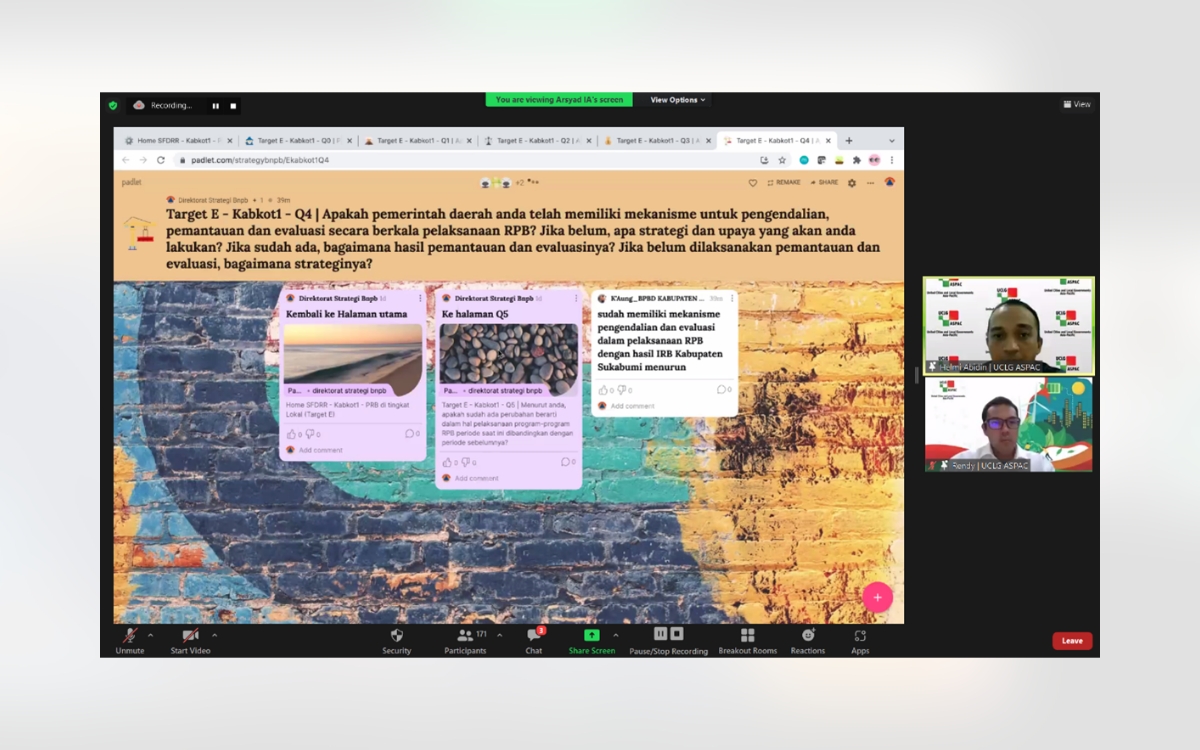18 October 2021 | UCLG ASPAC, on the occasion of International Disaster Risk Reduction Day 2021 (Bulan PRB 2021), led a focus group discussion (FGD) workshop organised by the Indonesia National Disaster Management Agency (Badan Nasional Penanggulangan Bencana/BNPB) for local governments in Indonesia to progress in the reporting process of the Achievement of Disaster Risk Management Strategies at Local Level (Target E).
In the workshop attended by more than 300 local representatives (province, municipality, and regency), UCLG ASPAC reiterated the requirement of local governments in Indonesia to formulate disaster risk assessment and disaster management plan as stated in the President Regulation related to Standard of Minimum Services.
Opening the workshop was Mr. Agus Wibowo, the Director of System and Strategy of BNPB. He emphasised the important linkages between the Sendai Framework, Sustainable Development Goals (SDGs), Paris Climate Agreement, and National Disaster Master Plan to achieve the Indonesia disaster resilience target by 2044 beyond the 2030 global agenda. He further shared that since 2021 BNPB has started to prepare the draft document of the Sendai Framework report to be submitted to the United Nations Office for DRR (UNDRR) in 2022.
The FGD workshop started with the UCLG ASPAC Resilience Team led participants through five major questions regarding the achievements of regions in drafting both the disaster risk assessment and disaster management plan. The questions also touched upon the challenges in the process and the ways they are integrated into local development plans. The feedback varied according to different conditions faced by regions.
There were some regions (such as West Java, Bali, Jakarta, West Nusa Tenggara Province) already finalised the required drafts and legalised them through mayoral/governor instruction. However, most regions (including Central Sulawesi, Central Java, West Kalimantan, East Java, East Nusa Tenggara, Maluku Province) are still in the process of drafting.
Challenges mentioned were mostly on the funding document drafting as there was budget reallocation due to the COVID-19 situation and slow approval response from the legislative. Another main problem was the lack of resources and coordination with the local governments (due to the COVID-19 pandemic) in updating the disaster management plans including the risk assessment study. There were also issues with the standardised format of the documents (not accepted by the local legal department) and the approval process (before legalisation) taking more than one year. The final discussion was concluded with responses to questions from participants regarding the standardised document format and the process of legal regulation which was addressed to the BNPB and suggestions to clarify the procedure through the ministry regulation on local disaster management plan development.











